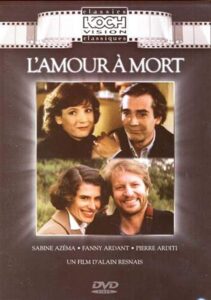Alain Resnais’ film maudit in more ways one, this haunting and rarely seen 1984 feature, his third collaboration with screenwriter Jean Gruault, is one of his boldest experiments in musical form. Resnais commissioned avant-garde composer Hans Werner Henze, who previously wrote the score to Muriel, to write a chamber piece consisting of 52 discontinuous short sections; until the film’s final shot, when this music is finally combined with the action, it is performed exclusively between scenes, over a black background that is most often traversed by drifting motes resembling snowflakes. The plot, featuring the same actors as Resnais’ subsequent Melo, is a love story about an archaeologist (Pierre Arditi) who is pronounced dead by a doctor in the film’s first scene only to come back to life a few moments later; though he and his devoted wife (Sabine Azema) are atheists, they are subsequently preoccupied with the meaning and reality of death and how this will or won’t separate them, which they discuss with a couple who are their friends and neighbors (Andre Dussollier and Fanny Ardant), both Lutheran ministers. A creepy film that was being written while Francois Truffaut (whom Gruault worked with often, on films including Jules and Jim and The Green Room) was dying, this recalls certain efforts of Ingmar Bergman in both its austerity and its morbidity; the music functions basically as a zone of meditation as well as a kind of metaphor for death and nonbeing–though many of these passages are quite brief and sometimes the motes are simply distracting. Powerfully acted, and certainly a personal and sincere project on Resnais’ part, this is the kind of failure that to my mind towers over a good many inconsequential successes–indigestible on some level but impossible to shake off. This is its first Chicago screening, and likely to be its only one for the foreseeable future. 93 min. (JR)

